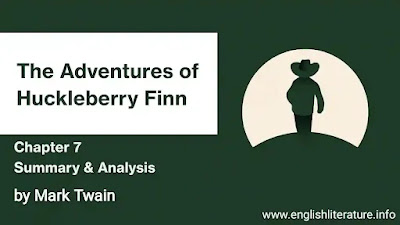Also Read
SUMMARY
Huck wakes up the next morning and finds Pap standing close to him and staring at him. The latter doesn't remember what had happened the previous night. He asks Huck what he is doing with the rifle. Huck justifies being in possession of the rifle by saying somebody had tried to break in the previous right and it was an act of self-defense. Pap demands the reason why Huck did not wake him up and take his help. He then sends Huck outside to see if they had some fish for breakfast. As Huck goes to the riverside, he notices a beautiful canoe sailing in the water. He dives into the water, with all his clothes on. At first, he contemplates taking it for Pap because it would make him happy. He makes a mental estimate that the canoe would be worth almost ten dollars. He reaches the shore and doesn't find Pap anywhere around. As he is looking for a place to hide the canoe, an idea strikes him. Instinctively, he hides the canoe, which he plans using later, in order to escape. Pap accuses him of being so slow and tardy and for taking such a lot of time. Huck conjures up a taise story of having fallen into the river. Pap believes him because. Huck is all wet.
After breakfast, Pap dozes off to sleep again. He commands Huck to wake him up in case of another incident of somebody trying to break in. Huck is left alone with his thoughts. He thinks of how he can prevent both Pap and Widow Douglas from following him.
In the evening, both father and son go to the riverside again to see if they can get their hands on some logs of wood that they could sell. They manage to lay their hands on a nine-log raft. Elated, Pap proceeds to town to sell it. He locks Huck in the log cabin before going. Assessing that his father won't get back that night, Huck had the entire night to plan his break out. He takes all the edible stuff, such as coffee, sugar, bacon, along with the ammunition and utensils, to the canoe. He kills a wild pig, smears its blood all over the axe. He tears a few strands of his own hair from his head and sticks them to the blood on the axe. In short, he engineers the scenario in such a way so as to make it appear as if he has been killed after a brawl with the killer. He stands back and assesses the scenario. He feels happy at his craftsmanship when he notices that the sawed part of the log-cabin is not conspicuous at all. Following this, he cruises to Jackson's island where he takes a short nap after hiding his canoe behind the willow branches.
CRITICAL ANALYSIS
Tescapehe river Mississippi stands for freedom and from undesirable circumstances. This chapter prepares us for this enduring symbol that we shall run into, throughout the novel. The river is idyllic and extremely peaceful as it promises a carefree life that Huck has always yearned for. "I laid there, and had a good rest, a smoke out of my pipe, looking away into the sky; nota cloud in it. The sky looks ever so deep when you lay down on your back in the moonshine; I never knowed it before". Critics have adjudged the role of the river as a character in its own right. It is Twain's "strong brown god" that proves to be a safe haven for people trying to escape the influence of society.
Pap's desire to be with his son, for purely ulterior motives, is in sharp contrast to Jim's terror of being separated from his wite and children whom he truly loves. Despite the notion of the "white" society, that niggers are lesser mortals and are not capable of emotions like others are, Jim has more profound and sincere feelings for his family than Pap does.
Huck considers Tom his role ideal as the latter stands for all that he couldn't be. Having had the advantage of being born in a respectable family, having had the benefit of what society considers good and reputable, Tom has been more fortunate in life. Though Huck's life is, ostensibly, more carefree and relaxed, it is not as comfortable fro worldly standards. Since Huck holds Tom in such high esteem, when Huck contrives his own murder, he yearns for Tom's assistance. He holds Tom in high esteem for his education and broader exposure that the latter has received. He believes that Tom's elaborate touches could have made his plan more foolproof. Little does he realize that, owing to is own "natural learning" and a superior instinct, he himself is capable of much more than He thinks. "I did wish Tom Sawyer was there; I knowed he would take an interest in this kind of business, and throw in the jancy touches. Nobody could spread himself like Tom Sawyer in such a thing as that". It is not the "fancy touches" that are required, but Huck's own primitive ones, to give the setting a semblance of realism. Huck's instincts are, definitely, more common-sense and cerebral than those of Tom. The careful planning of his escape reveal Huck's ingenuity, intelligence and imagination.
